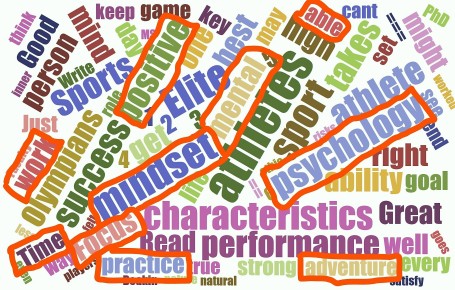I used to define success as the ability to have a perfect workout or race– in my mind that that meant hitting under pace or running a PR. I used to think that being dropped by training partners meant for an unsuccessful day, even if I was working at my max. I used to think that being physically and mentally exhausted by weeks and months of hard training meant that I was weak, especially if others were not feeling the same. I used to think that if I could conquer every workout, then I was destined for a good race. I used to think that every performance was indicative of my value and ability as an athlete and a person. And I used to think that what was on paper from workouts and races should dictate the level of confidence that I had in my athletic abilities.
I used to think that these weaknesses and imperfections Defined Me.
Recently, I have had a lot of conversations with other athletes that have centered around the definition of success relating to athletics. As a volunteer high school coach, former NCAA athlete, and current post-collegiate athlete, I interact with a lot of competitive people in my day to day. And throughout these interactions, I have found that most people define success as a top level athlete in the same way that I used to define it: Strong. Fast. Winning. Accomplished. Hard Working. Defined. Speed. Power. Endurance. These definitions are (mostly) all metrics to which a number and value can be associated. Squat max, quarter speed, winning record, ability to finish workouts, number of points, VO2 max… the list of “measurables” that one can tag on an athlete goes on and on.
Today, I got curious. I googled, “Definition of an elite athlete.” I generated a word cloud by visiting the pages of the top 5 results returned on my google search. This is the word cloud that was produced:

Now, OBVIOUSLY an elite athlete is fast (DUH) and strong (DUH) and powerful (DUH) and fit (DUH). But in my experience, the issue with using these physical dimensions as the only means to define elite athletes is that it puts a cap on the way that I train, race, and compete. It causes me to be hyper aware of my own insecurities, imperfections, and non-successes. As a result of this, I am inclined to train at a lower level so as to mask my athletic weaknesses rather than face them head on and improve. I am inclined to race more conservatively so that I don’t make mistakes rather than confidently so that I put myself in contention to win races. I am inclined to compete fearful that I am going to fail rather than fearless of the end result. I strip myself of the freedom to race without mental barriers and the ability to forgive myself and move on when I don’t perform.
Intrigued with the results from the first search, I generated another word cloud, this time searching, “Qualities of an elite athlete.” I changed out the word definition for the word qualities. This was the result:

Simply swapping one word in my search created an entirely different Word Cloud. My favorite word returns were positive, adventure, focus, mindset, time, mental, and able. All of these words had to do with immeasurable characteristics. They had to do with effort, trust, patience, joy, passion, attitude, and mentality. These are words that represent qualities. Not definitions.
Too often, I have been tempted to focus on the words associated with the definition of an elite athlete. These words are flashy. I love being able to rattle off my PR’s, or my latest workout where I completely kicked asphalt. It’s a lot less attractive to focus on a risk I took in a race or in practice that completely backfired. Its a lot less exciting to return to a workout that completely kicked my butt the first time around. But focusing on maintaining the qualities of an elite athlete rather than the definition of an elite athlete has allowed me to be refined and become a better runner.
Weaknesses are a necessary prerequisite to climb to the next level. Putting myself in new and challenging situations is an opportunity to be refined by my weaknesses, not defined. Developing this mentality has shown me that just because something is challenging does not mean that I am weak or that I am a failure. It has shown me that achieving perfection over time of something difficult is much more rewarding than achieving perfection instantaneously of something mediocre.
This mentality has shown me that the way I frame my mindset really does make a difference in the way that I carry out my day to day work, and that positivity really does go a long way in sustaining this mentality. It has shown me that setting a standard sometimes puts a cap on my ability to push myself to my maximum because I am far too easily satisfied once that standard has been met. It has shown me that I can press on beyond my preset limits for myself, and set far reaching goals beyond where I would have dared set a few years ago.
Ultimately, I believe that living my life both on and off the track with the perspective of being refined rather than defined by my weaknesses and trials aligns with what Jesus says about all of us. Jesus died on the cross, so I am viewed as perfect and blameless regardless of my accomplishments (or lack thereof) here on this earth. I am cared for and valued no matter what my progressive cut-down splits were today. Jesus isn’t concerned with my numbers– He is concerned with my heart. This gives me the courage that is necessary to take chances in this sport. And because of this, I am free to be imperfect because I am loved by a perfect God.
God desires to refine me through my weaknesses. He does not define me through them.
I now define success as my ability to walk away from a workout or race a better athlete physically and mentally than I was at the start– often this means taking time for reflection and simply turning one page to the next. I now know that being dropped by training partners (or beeped at by my GPS) means it just wasn’t my day, after all– I am a human not a robot. I now know that being physically and mentally exhausted by weeks and months of hard training means that I am getting stronger, especially when I buy in to my own training and stop comparing my training to that of others. I now know that I am not going to be able to conquer every workout first try, and that being challenged paves the way for better racing. I now know that situational performance is only a small part of who I am as an athlete and a person, and I am loved by The Lord all the same. And I know that my performances in workouts and races do not have to dictate the level of confidence that I have in my athletic abilities.


